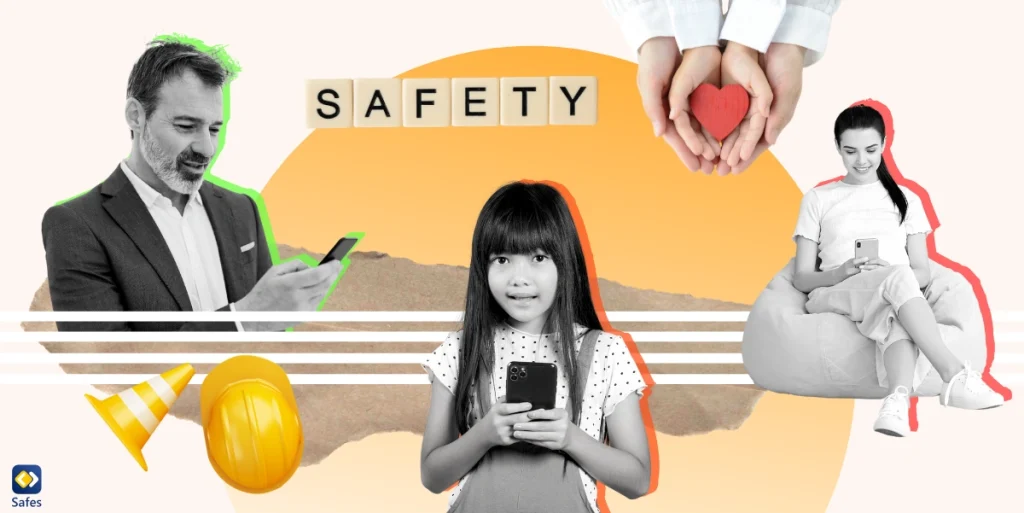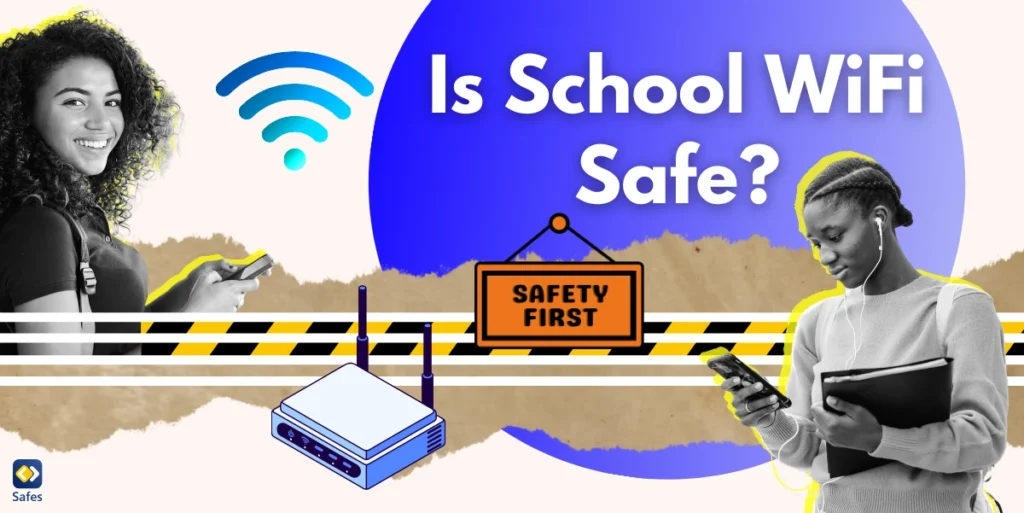It’s natural for parents to be concerned about their children’s activities, especially in this digital age where smartphones have become an integral part of our lives. One question that often arises is, “Can I mirror my child’s phone to mine?” The answer is yes, but there are ethical and legal rules to that. This blog will delve into the topic, exploring the various methods, tools, and implications of phone mirroring, including the potential benefits and drawbacks.
Download and Start Your Free Trial of the Safes Parental Control App
Understanding Phone Mirroring
Phone mirroring refers to the process of duplicating the screen of one device onto another. This means you can see exactly what your child does on their phone in real-time. Several apps and tools can help you with this, such as the Eyezy and SMS Mirror apps. These apps can be found in the Google Play Store and Apple App Store and offer a range of monitoring features.
In the following, we will discuss four methods that you can use to monitor your child’s activities on their phones, including seeing their text messages:
Method 1: Using Spy Apps
Spy apps allow you to mirror someone’s phone to yours, in this case, your child. To use these apps, you need to install them on your child’s phone, and they will stay hidden, recording all activities and sending the data to your device. Some of them not only allow you to monitor social media apps, call logs, and text messages but also enable you to track your child’s location, set a virtual fence (Geofence), and even listen to phone surroundings and take screenshots from your child’s phone screen.
Pros:
- Provide a comprehensive overview of your child’s activities, including social media apps, call logs, and text messages.
- Allow you to track your child’s location, ensuring their safety.
- Enable you to set virtual boundaries (Geofence) and receive notifications when your child enters or leaves a designated area.
- Provide the ability to listen to phone surroundings and take screenshots for added monitoring.
Cons:
- Raise ethical concerns as it invades your child’s privacy and may create a lack of trust between you and your child.
- Can potentially harm the parent-child relationship, leading to communication breakdowns and resentment.
- May hinder your child’s development of independence and personal responsibility.
- Can cause stress and anxiety for both the parent and the child, as constant monitoring can be intrusive and overwhelming.
- Spy apps may not always be reliable or accurate, leading to misunderstandings and false accusations.

Method 2: Using iCloud for iPhone Monitoring
For iPhone users, iCloud provides a way to mirror your child’s phone. By enabling the sync feature on your child’s iPhone, you can log into their iCloud account and see all synced phone activities. However, this method has limitations, such as only showing data that has been backed up, meaning recent activities may not be included.
Pros:
- Convenient for iPhone users as it utilizes the existing iCloud feature.
- Provides access to synced data, including contacts, messages, photos, and app data.
- Allows parents to monitor their child’s activities without installing any additional apps on the child’s phone.
- Offers a centralized platform for managing and tracking multiple devices linked to the same iCloud account.
Cons:
- Limited to iPhones and iCloud users, excluding users of other platforms.
- Only shows data that has been backed up, meaning recent activities may not be included.
- Does not provide real-time monitoring or access to live activities.
- Limited to checking SMS messages and may not provide a comprehensive view of all phone activities.
- Requires the child’s iCloud login credentials, which may raise concerns about privacy and security.
Method 3: Using the SMS Mirror App
The SMS Mirror app is a unique message mirroring tool that lets you access your child’s SMS messages via Wi-Fi. This application provides real-time monitoring of your child’s text messages, call logs, and contacts. It’s a practical solution if you’re primarily concerned about who your child communicates with via text.
Pros:
- Provides real-time monitoring of your child’s text messages, ensuring you stay informed about their communication.
- Offers access to call logs and contacts, giving you a comprehensive view of their communication network.
- Can be an effective solution if your primary concern is monitoring who your child is communicating with via text.
- Does not require access to the child’s iCloud account or the installation of any spy apps on their phone.
- Can be a valuable tool for identifying potential risks or inappropriate conversations.
Cons:
- Limited to monitoring SMS messages only, potentially leaving out other forms of communication such as social media or messaging apps.
- Requires installation and setup on both your device and your child’s device, which may be time-consuming and needs technical expertise.
- Relies on a stable Wi-Fi connection for synchronization, which may not always be available or reliable.
- Raises ethical concerns as it invades your child’s privacy and may create a lack of trust between you and your child.
- May lead to strained parent-child relationships and hinder the development of trust and independence.
Method 4: Using Parental Control Apps Like Safes
Rather than mirroring your child’s phone, a more ethical and balanced approach would be using a parental control app like Safes. This app only sends notifications when your child sends or receives suspicious SMS or messages on social media platforms like WhatsApp, Facebook, Instagram, and YouTube. This way, you can ensure your child’s safety without violating their privacy.
You can also use Safes to filter inappropriate content from your child’s social media feed, block harmful websites and apps, and remove risky search keywords to ensure your child doesn’t stumble on search results that might put them at risk.
Moreover, Safes is equipped with location tracking and Geofencing features. You can track where your child is at any given moment and receive notifications when your child enters or leaves a predefined geographical location.
All of these features are accessible remotely, on your own phone, or via the Safes web panel. Once you install Safes Kid, a companion app to Safes, on your child’s phone, you don’t need to touch it again to access the information you need. That means you can protect your child without intruding.
Pros:
- Offers a balanced and ethical approach to monitoring your child’s phone activities while respecting their privacy.
- Sends notifications only for suspicious SMS or messages on popular social media platforms, ensuring you stay informed without invading your child’s privacy.
- Provides the ability to filter inappropriate content, block harmful websites and apps, and remove risky search keywords, creating a safer online environment for your child.
- Equipped with location tracking and Geofencing features, allowing you to ensure your child’s safety and receive notifications when they enter or leave specific locations.
- Remote accessibility via your own phone or the Safes web panel, making it convenient to monitor and protect your child without the need to physically access their phone.
Cons:
- Requires installation and setup on both your device and your child’s device, which may be time-consuming and may require technical expertise.
- Some features may require a subscription or in-app purchases for full access.
If you are interested in trying Safes for free, you’re welcome to download it from our website, Google Play, or App Store. For more information about putting parental controls on different platforms and devices, use the following resources:
- Windows parental controls
- Macbook parental controls
- Android parental controls
- iPhone parental controls
Want to ensure your child’s online safety? Sign up for a free trial with Safes so you access the resources to mirror your child’s phone and monitor their digital activities responsibly.

Benefits of Monitoring Your Child’s Digital Activities
Here are some of the main reasons why you should consider monitoring your child’s digital activities using the different methods discussed in this article:
Enhanced Safety
One of the main reasons parents want to mirror their children’s phones is to ensure their safety. You can keep tabs on their online activities, including who they are interacting with, what content they are consuming, and even their real-time location.
Monitoring Online Activities
By monitoring your child’s phone, you can get a firsthand look at their online activities. Experts at Common Sense Media suggest using parental control apps if your child is habitually hiding things from you. You can see what apps they use, what websites they visit, and who they communicate with. This can help you guide them toward healthier digital habits and intervene if they get exposed to inappropriate content.
Enforcing Digital Rules
Monitoring can also help you enforce your household’s digital rules. If you have set rules about screen time, app downloads, or certain types of content, you can use mirroring to ensure these rules are followed.
Considerations When Monitoring Your Child’s Digital Activities
While monitoring your child’s phone provides several benefits, it’s essential to consider the potential drawbacks and ethical implications.
Privacy Concerns
Privacy is a significant concern when it comes to phone mirroring. Even though you might be doing it with the best intentions, mirroring can be seen as an invasion of privacy. This can lead to trust issues and cause strain in your relationship with your child.
Potential Misunderstandings
Texts and online interactions can often be taken out of context, leading to misunderstandings. You may misinterpret innocent conversations or activities without full knowledge of the situation.
Ethical Considerations
While legal in many jurisdictions, mirroring someone’s phone without consent raises ethical questions. It’s essential to consider these before deciding to mirror your child’s phone.
Conclusion: What’s the Best Method to Monitor Your Child’s Digital Activities?
While you technically can mirror your child’s phone to yours, it’s essential to consider the implications carefully. It might be more beneficial to use a parental control app like Safes, which provides a balance between ensuring safety and respecting privacy. For more info, check out our list of the best parental control apps on the market. Ultimately, open communication and education about online safety might be the most effective way to ensure your child uses their smartphone responsibly.
Your Child’s Online Safety Starts Here
Every parent today needs a solution to manage screen time and keep their child safe online.
Without the right tools, digital risks and excessive screen time can impact children's well-being. Safes helps parents set healthy boundaries, monitor activity, and protect kids from online dangers—all with an easy-to-use app.
Take control of your child’s digital world. Learn more about Safes or download the app to start your free trial today!




